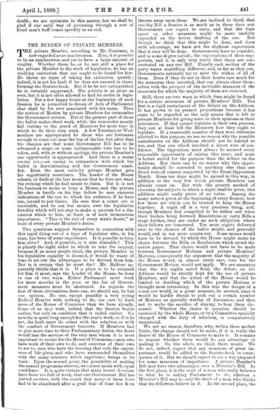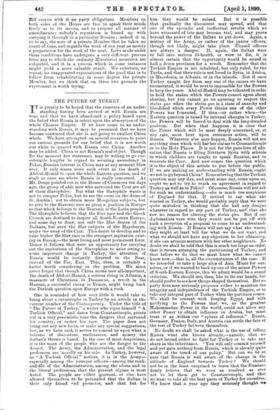THE BURDEN OF PRIVATE MEMBERS. T HE private Member, according to
Mr. Courtney, is now regarded as an anachronism. if so, it is possible to be an anachronism and yet to have a large amount of vitality. Whether there be, or be not, still a place for the private Member in the work of legislation, he has an undying conviction that one ought to be found for him. He shows no signs of taking his extinction quietly ; indeed, it is not his fault if he does not succeed in trans- forming the Statute-book. But if he be not extinguished he is certainly suppressed. His activity is as great as ever, but it is not often allowed to find its outlet in legis- lation. For a few happy hours at the beginning of each Session he is permitted to dream of Acts of Parliament that shall be for ever associated with his name. Then the notices of Motion by private Members far outnumber the Government notices. But of the greater part of these the ballot makes short work, while the remainder mostly fall victims to the greed of Ministers for more time in which to do their own work. A few Tuesdays or Wed- nesdays are appropriated by those who are fortunate enough to come out near the top of the list, but after that the chances are that some Government Bill has to be advanced a stage, or some indispensable vote has to be taken, and, with or without apology, the private Member's one opportunity is appropriated. And there is a worse enemy yet,—an enemy in comparison with which the ballot is discriminating and the .Government unsel- fish. Even the most unlucky private Member gets his opportunity sometimes. The Leader of the House relents, or finds at the last moment that he does not want the evening which he had meant to claim. But it is not his business to make or keep a House, and the private Member is hardly on his legs before he sees ominous indications of the use to which his audience, if he have ' one, intend to put theirs. He sees that a count out is inevitable, and he can but mourn over the legislative frivolity which will not stay to .make a quorum for a dis- cussion which to him, at least, is of such tremendous importance. "This is the end of every man's desire," at least of every private Member's desire.
Two questions suggest themselves in connection with this rapid dying out of a type of legislator who, in his time, has been of some importance. Is it possible to keep him alive ? And, if possible, is it also desirable ? This is plainly the right order in which to take the inquiry, because if, as many people think, the private Member in his legislative capacity is doomed, it would be waste of time to set out the advantages to be derived from him. But is it certain that he must die ? Mr. Balfour ap- parently thinks that it is. If a place is to be retained for him it must, says the Leader of the House, be done in one of two ways. Either Parliament must work for more months in the year, or the list of Govern- ment measures must be shortened. As regards the first of these alternatives there can, we should say, be but one opinion. No one, except possibly a very young Radical Member with nothing to do, can care to have more of the House of Commons than we have already. Some of us may wish, indeed, that the Session began earlier, but only on condition that it ended earlier. Six months is quite long enough for the year's work, or if it be not, the fault must lie either with the selection or with the conduct of Government business. If Members had to give more time to their Parliamentary duties, the State would lose the services of the very men whom it is most important to secure for the House of Commons,—men who have work of their own to do, and concerns of their own to see to, men who have the training that only the experi- ence of life gives, and who have surrounded themselves with the many interests which experience brings in its train. Upon the second point, the possibility of making the annual programme shorter, we cannot speak with equal confidence. It is quite certain that many recent S-ssione have been too full of work, that one Government Bill has jostled another, with the result that many of them have had to be abandoned after a good deal of time has b 'en thrown away upon them. We are inclined to think that one big Bill a Session is as much as in these days any Government can expect to carry, and that the time spent on other measures might be more usefully expended on the better drafting of the one. But though we think that this might he done, and done with advantage, we have not the slightest expectation that it ever will be done. Governments have to consider, and in some degree satisfy, the expectations of their sup- porters, and it is only very rarely that these are con- centrated on any one Bill. Usually each section of the party wants something different, and, so far as they can, Governments naturally try to meet the wishes of all of them. Even if they do not in their hearts care much for the measures thus extorted, they can always cheer them- selves with the prospect of the inevitable massacre of the innocents for which the majority of them are reserved.
Still, there are two ways in which time might be found for a certain minimum of private Members' Bills. The first is a rigid curtailment of the debate on the Address. It has grown to its present proportions because it has come to be regarded as the only means that is left to private Members for giving voice to their opinions or their grievances. If they cannot legislate in their own persons, they can at least tell the Ministers how they ought to legislate. If a reasonable number of days were otherwise allotted to this purpose, we see no reason why the possible amendments on the Address should not be limited to one, and that one which involved a direct vote of con- fidence. The Opposition must always be secured every reasonable opportunity of raising this issue, and none is better suited for the purpose than the debate on the Address. But there can be no reason why this oppor- tunity should be extended to anything else than one direct vote, of censure supported by the Front Opposition Bench. Some ten days might be gained in this way, in addition to the very few which private Members can already count on. But with the present method of choosing the subjects to which a night shall be given, this addition might easily prove of no value. Among the many notices given at the beginning of every Session, bow few there are which can be trusted to keep the House together. A night off is a very precious thing, and, though Members feel compelled to be within call when their leaders bring forward Resolutions or carry Bills a stage further, they are under no such obligation where their fellows are concerned. Ten more nights delivered over to the chances of the ballot might, and generally would, end in ten more counts out. Some means would have to be devised by which the House might make its choice between the Bills or Resolutions which crowd the notice paper. That choice would not have to be made between Government Motions and private Members' Motions, consequently the argument that the majority of the House would, in almost every case, vote for the Government Motion, would not apply. We are assuming that the ten nights saved from the debate on the Address would be strictly kept for the use of private Members, and that the action of the House would be limited to deciding which of the private Motions it thought most interesting. In this way the danger of a count out would, in a great measure, be averted, since it would be hardly decent to pick out a, certain number of Motions as specially worthy of discussion, and then not to make the sacrifice of staying to hear them dis- cussed. Whether the choice in question should be exercised by the whole House, or by a Committee specially charged with the duty of selection, is comparatively immaterial.
We see no reason, therefore, why, within these modest limits, the change should not be made, if it is really the desire of the House of Commons to make it. It remains to inquire whether there would be any advantage in making it. On the whole, we think there would. We do not, indeed, expect that any measures of great im- portance would be added to the Statute-book in conse- quence of it. But we should expect to see a way prepared for some measures of importance. A private Member's Bill may have two advantages over a Minister's Bill. In the first place, it is the work- of a man who really believes in what he is asking Parliament to do, whereas a Minister's Bill may be only the work of a man who thinks that his followers believe in it. Iu the second place, the Bill carries with it no party obligations. Members on both sides of the House are free to speak their minds freely as to its merits, and to propose all manner of amendments ; nobody's reputation is bound up with carrying it through in a particular Session ; indeed it is, so to say, the note of a private Member that he takes no count of time, and regards the work of one year as merely a preparation for the work of the next. Laws made under these conditions have undergone a very different process from any to which the ordinary Ministerial measures are subjected, and it is a process which in some instances might yield a more valuable result. We entertain, we repeat, no exaggerated expectations of the good that is to follow from rehabilitating in some degree the private Member, but we think that on these two grounds the experiment is worth trying.







































 Previous page
Previous page